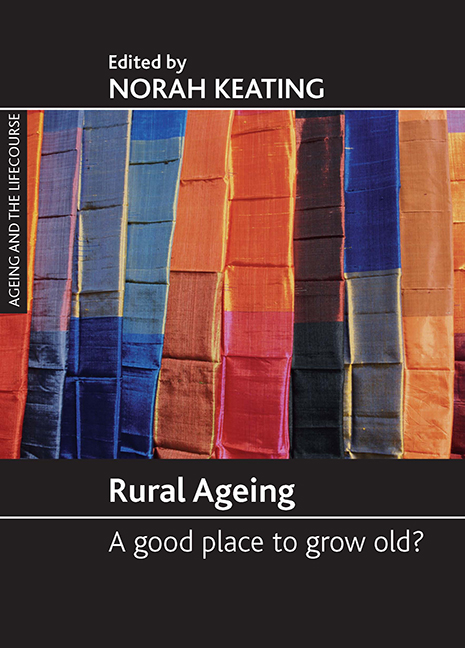Book contents
- Frontmatter
- Contents
- Foreword
- Acknowledgements
- Notes on contributors
- one A critical human ecology perspective on rural ageing
- two Crossing borders: lifecourse, rural ageing and disability
- three Rurality and ageing well: ‘a long time here’
- four The evolution of networks of rural older adults
- five Distance, privacy and independence: rural homecare
- six Respite for rural and remote caregivers
- seven Ageing, disability and participation
- eight Participation in rural contexts: community matters
- nine Staying connected: issues of mobility of older rural adults
- ten Ageing and social exclusion in rural communities
- eleven Age-friendly rural communities
- twelve Revisiting rural ageing
- References
- Index
- Other titles in the Ageing and the Lifecourse series
Foreword
Published online by Cambridge University Press: 19 January 2022
- Frontmatter
- Contents
- Foreword
- Acknowledgements
- Notes on contributors
- one A critical human ecology perspective on rural ageing
- two Crossing borders: lifecourse, rural ageing and disability
- three Rurality and ageing well: ‘a long time here’
- four The evolution of networks of rural older adults
- five Distance, privacy and independence: rural homecare
- six Respite for rural and remote caregivers
- seven Ageing, disability and participation
- eight Participation in rural contexts: community matters
- nine Staying connected: issues of mobility of older rural adults
- ten Ageing and social exclusion in rural communities
- eleven Age-friendly rural communities
- twelve Revisiting rural ageing
- References
- Index
- Other titles in the Ageing and the Lifecourse series
Summary
Population ageing is a major force shaping the 21st century. The number of people aged 60 years and over as a proportion of the global population will double from 11% in 2006 to 22% by 2050. By then, there will be more older people than children for the first time in human history. While Europe, North America and Oceania are the oldest regions of the world – and will remain so in upcoming decades – developing countries are ageing faster within a context of scarcer resources. Population ageing marks the culmination of successful human development during the last century and presents major challenges for this century. Living longer is the fruit of critical gains in public health and in standards of living. The World Health Organization (WHO) recognises the importance of this demographic trend as expressed in its 1996 Brasilia Declaration on Ageing that ‘healthy older people are a resource for their families, their communities and the economy’.
While older adults may be an important resource, they do not always live in settings in which they are able to flourish. And those in rural communities may be doubly disadvantaged. Like others, they require supportive and enabling living environments to compensate for physical and social changes associated with ageing. While some may live in idyllic settings, buffered from the social problems of urban areas, many face challenges of poor service infrastructure, isolation, poverty and harsh climate. They need to be assisted and protected.
Rural communities benefit a country's entire population. They produce food and other basic necessities of daily living, provide natural resources that underpin national industries and often help to preserve the environment. Yet to be sustainable, rural communities must provide the structures and services to support their residents’ well-being and productivity. Rural ageing provides an in-depth critical analysis of ways to ensure that rural settings are places in which older adults can flourish, as well as identifying barriers that can lead to exclusion.
In this book, authors speak to the connections of older adults to rural places and how identities of older adults are created and re-created in interaction with the landscapes that are integral to their lives. They also consider ageing in the context of important people in the lives of adults as they reach very old age and the challenges in providing services to older rural adults in widely dispersed communities and in supporting caregivers.
- Type
- Chapter
- Information
- Rural AgeingA Good Place to Grow Old?, pp. iv - vPublisher: Bristol University PressPrint publication year: 2008



